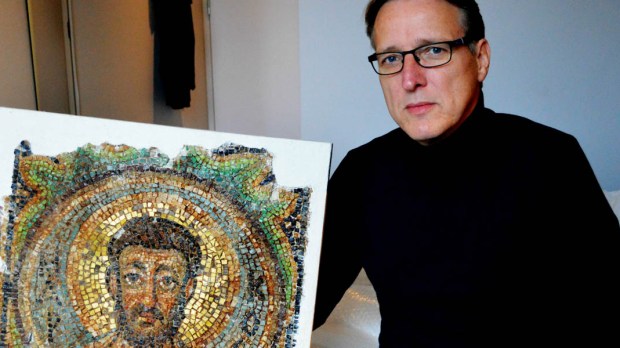Lenten Campaign 2025
This content is free of charge, as are all our articles.
Support us with a donation that is tax-deductible and enable us to continue to reach millions of readers.
Many of us have been tantalized by the romantic adventures of Indiana Jones, but for art historian and appraiser Arthur Brand, those movies became a vocation. Dubbed “The Indiana Jones of Art,” Brand has been responsible for recovering many priceless works of art which have been stolen over the years.
Now, after a two-year investigation, he has restored a 1,600-year-old Cypriot mosaic to its rightful home. The piece of Byzantine art, depicting Saint Mark, is one of the last to be recovered from a series of mosaics stolen from the walls of a church in Cyprus in the 1970’s.
“This is a very special piece that’s more than 1,600 years old. It’s one of the last and most beautiful examples of art from the early Byzantine era,” Brand told the AFP.
Brand was not always chasing down criminals and liberating pieces of art which have fallen into the wrong hands. He was once just a simple art appraiser and trader. After one transaction in 2002, closer examination of the piece revealed that he had been duped into buying a forgery. He took to the phone and, after a round of calls, found a new partnership with a reformed art thief, who advises him.
While Brand does not carry a whip and a gun — and he doesn’t seem to have a high-crowned, wide-brimmed sable fedora — he contends with some of the seedier elements in the pursuit of stolen art. Using his quick wit and patient research he has maneuvered around neo-Nazis, the Irish Republican Army, the Italian Mafia, along with all the unsavory elements in between.
Brand says that terrorist organizations will often steal or acquire stolen art for the sake of leverage. If a member of a group is arrested, they will offer up a priceless piece of art long thought to be lost in exchange for their return. In one case, with the Italian mafia, a work of art was offered in return for more phone privileges with their imprisoned members.
The investigator was able to track down the mosaic of Saint Mark after a tip from a London art dealer. In August, Brand traveled to Monaco where he met with a series of intermediaries, some of which were from the black market. Their information allowed him to track the mosaic to a wealthy British family, who were unaware that it was a stolen piece when they bought it, nearly 40 years ago.
“They were horrified when they found out that it was in fact a priceless art treasure, looted from the Kanakaria Church after the Turkish invasion,” Brand told the AFP.
Brand convinced the family to give the piece back to “the people of Cypris” in return for a small fee to cover restoration and storage costs.
In 2015, Brand was praised for finding two massive bronze statues made by Nazi sculptor Joseph Thorak that are referred to as “Hitler’s Horses”. He considers discovering the Cypriot mosaic to be an even greater accomplishment.
“It was one of the greatest moments of my life,” the detective said.
With the addition of the Saint Mark mosaic, 12 pieces of the trove stolen from Cyprus have been returned. While several of the works are still lost, the Cyprus government and church have worked ceaselessly to see them returned.
Maria Paphiti, a former department head at British auction house Christie’s, said of the collection:
“The mosaics of Kanakaria are of immense importance in Christian art and world culture,” She continued to explain, the ensemble “is among a handful of artworks that escaped the menace of Byzantine iconoclasm” in the eighth and ninth century, Paphiti, an art historian and world authority on Byzantine art told AFP.


